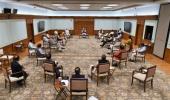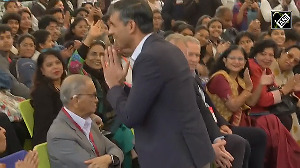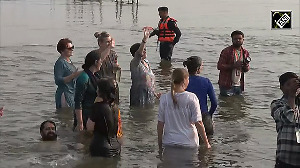'Without doubt, India's success story will come up for close scrutiny when Modi's prime ministerial legacy is summed up in history.'
'A failure is simply unthinkable.'
'And the success will largely depend on national unity,' notes Ambassador M K Bhadrakumar.

A national strategy to tackle the coronavirus pandemic has appeared, finally.
Prime Minister Narendra Damodardas Modi's interaction with state chief ministers on Thursday becomes the first milestone in a challenging journey ahead.
The PM outlined an exit strategy to get out of the 'total lockdown'.
It is a strategy with Indian characteristics which draws from other countries' harrowing experiences but is riveted on our country's political economy.
Above all, it takes into account the ground reality that agriculture employs more than 50℅ of the Indian workforce and contributes close to one-fifth of the country's GDP.
Clearly, a total lockdown is neither feasible nor sustainable.
A total lockdown in India for an indefinite period is hugely damaging to the economy and the social fabric.
Thus, the salience of Modi's address to the chief ministers is that the present nationwide lockdown should have an 'exit strategy'.
The government's game plan is to 'ensure staggered re-emergence of the population' (to quote from the PIB readout (external link)) through an exit strategy that involves the lifting of lockdowns in phases.
The approach is not without risks as a probable surge -- a 'second wave' -- is always there.
The states have been asked to make suggestions in this regard keeping in view the local trends and conditions.
But there is consensus among the state chief ministers as regards the raison d'etre of lockdown as such.
That gives the government a free hand to resort to a selective/intermittent lockdown depending on the exigencies of the situation which may differ from region to region.
The government's approach, as outlined by the PM, implies that the 'hotspots' will be tackled in a differentiated approach of extended lockdown.
The PM underscored that the focus in the coming few weeks will be on 'testing, tracing, isolation and quarantine', apart from maintaining the supply of essential medical products and the availability of raw material for manufacture of medicines and medical equipment.
PM reiterated the importance of social distancing in preventing the spread of the virus.
Having said that, he also acknowledged that a flexible approach becomes necessary during the forthcoming harvest season, whereby 'some relaxation' will have to be made in 'social distancing' by the farm labour, which can only be enforced 'as much as possible'.
Plainly put, the efficacy of enforcing social distancing by anywhere near half the country's population is in doubt.
The PM put forth some innovative ideas to handle the procurement of grains, which is a core template of the agrarian economy.
The livelihood of hundreds of millions of people depends on how well the government machinery handles the procurement of grains after the harvest, which in turn would generate income for the farmers (and also keeps the supply chain at the mandis functioning.)
There have been doomsday predictions of food riots and famine stalking the countryside in the months to come.
Clearly, the stakes are very, very high.

Equally, the PM touched on certain other decisions by the government in regard of the infrastructure in healthcare in immediate terms to cope with the pandemic: a. Creation of dedicated hospital facilities for COVID-19 patients; b. Tapping into the resource pool of AYUSH doctors, paramedical staff, NCC and NSS volunteers; c. Establishment of Crisis Management Groups at district level and appointment of district surveillance officers.
The onus lies on the state governments, but the Centre is obliged to extend financial support to them.
But Modi didn't hold out any assurances.
One way out could be to raise the limits on borrowing by the states.
To be sure, this strategy will undergo some 'tweaking' as time passes.
The implementation at the state level remains to be seen.
That has always been the Achilles heel of the Indian system.
The dimensions of the challenge ahead are simply staggering, and these are early days.
In political terms, the times ahead will test the resilience of Indian federalism.
Without doubt, India's success story will come up for close scrutiny when Modi's prime ministerial legacy is summed up in history. (A failure is simply unthinkable.) And the success will largely depend on national unity.
This national crisis, which is comparable only to the Partition in 1947, should not become the stuff of political rhetoric.
In fact, no political party can absolve itself of responsibility.
The plain truth is that they were immersed so deeply in the slugfest over other issues that none of them anticipated the crisis approaching and woke up one day to find that the wolf has entered the house.
Modi has thrown the field open to the states to propose the country's exit strategy.
He stressed the importance of a single uniform strategy for the whole country.
But he also asked the state leaderships pointedly 'to brainstorm and send suggestions for the exit strategy'. So far, so good.
Responsible statecraft is an imperative in such extraordinary times.
As Abraham Lincoln once said, 'A house divided against itself cannot stand.'
Ambassador M K Bhadrakumar served the Indian Foreign Service for more than 29 years. He has served as India's ambassador to Turkey and Uzbekistan and has been a contributor to Rediff.com for well over a decade.











 © 2025
© 2025